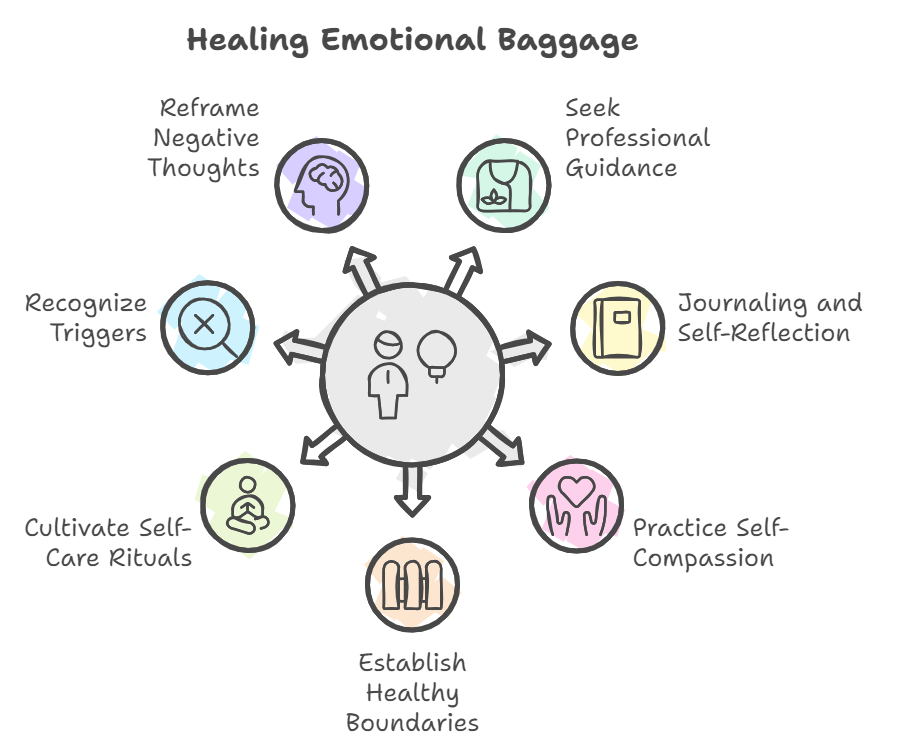Emotional baggage: We’ve all felt the weight of it — that heavy, invisible burden we drag along. It’s the residue of past hurts, disappointments, and traumas that cling to us.
This unseen cargo, like an overstuffed suitcase, weighs us down. It hurts our ability to live fully and embrace new experiences.
“Owning our story and loving ourselves through that process is the bravest thing that we’ll ever do.”
Brené Brown
Emotional Baggage Meaning
Emotional baggage isn’t just a trendy term. It shows how past experiences shape our thoughts, feelings, and behaviors. It’s important to recognize that we don’t consciously choose this baggage.
This accumulation often stems from painful events, especially during our formative years. Childhood trauma1, such as abuse, neglect, or witnessing violence, can have a particularly profound impact.
Trauma isn’t limited to single catastrophic events. Chronic stress, such as growing up in a household with addiction, family dysfunction, or mental health issues also leaves its mark.
These adverse childhood experiences create deep-seated beliefs and patterns of behavior. They shape our baggage, our worldview and relationships.
Signs your body is releasing trauma
Emotional baggage: How can you tell if you’re carrying it around? This isn’t always obvious. Many people develop coping mechanisms, even subconsciously, to mask their emotional wounds.
But, unresolved issues often show in our emotions and relationships.
If you struggle with pervasive self-doubt, this might be a red flag. Chronic feelings of insecurity and unworthiness may stem from past experiences. They may have damaged your self-worth.
It can hurt our ability to set boundaries in relationships. This often leads to people-pleasing.
Another common indicator is difficulty trusting others. You may have faced betrayals or broken promises. They left you with trust issues.
A study on partner betrayal found it can shatter trust. This affects future relationships. These experiences can trigger our fear center. It can make it hard to open up or commit in future relationships.
Here are other signs you might be carrying emotional baggage:
- Fear of intimacy or commitment.
- People-pleasing tendencies.
- Difficulty setting boundaries.
- A pattern of attracting or staying in unhealthy relationships.
- Overreacting to minor stressors or perceived threats.
- Self-sabotaging behavior.
The Impact of Unresolved Trauma on Adult Life
Emotional baggage doesn’t just disappear on its own. These unhealed wounds can harm our mental health, relationships, and life.
Have you noticed patterns repeating themselves in your relationships? Are you drawn to people or situations that reinforce your old wounds? This might be your baggage playing out.
Our past experiences, especially early attachments, shape our attachment style. It affects how we relate to others and form emotional bonds. John Bowlby’s attachment theory explains how early childhood experiences influence these patterns.
What are the 5 signs of emotional suffering
Persistent Feelings of Sadness or Hopelessness: If you find yourself feeling consistently down or like there’s no way out of a situation, it could be a sign of emotional distress.
Difficulty Managing Stress or Anxiety: Overwhelming worry, anxiety, or an inability to handle stress can indicate that emotional suffering is affecting your mental health.
Withdrawal from Social Interactions: When you isolate yourself from friends, family, or activities you once enjoyed, it may be a sign that you’re struggling emotionally.
Changes in Sleep or Appetite: Emotional suffering often leads to significant changes in sleep patterns (insomnia or oversleeping) or eating habits (loss of appetite or overeating).
Physical Symptoms without a Clear Cause: Emotional pain can manifest physically, causing headaches, stomach problems, or unexplained fatigue, even when no physical illness is present.
For example, suppose someone grew up with an absentee father. They might then develop an anxious attachment style. They would constantly seek validation and reassurance in their adult relationships.
Knowing your attachment style can reveal your relationship patterns. It can show how your past affects your present.
The Link Between Trauma and Mental Health
Unresolved trauma can affect your mental health in many ways. According to WebMD2, those with unaddressed trauma may face an increased risk of mental health disorders.
This includes anxiety disorders, depression, and PTSD.
Trauma responses can manifest in various ways. Not everyone experiences them the same.
Some individuals may have a fawn trauma response. They try to please others to avoid conflict. Some may have a guilt complex. They blame themselves for things beyond their control.
You may also see stress-related issues, like headaches, digestive problems, or sleep troubles.
Emotional baggage harms our internal world. It also affects our relationships, work, and well-being.
Unpacking Your Emotional Baggage: Steps Toward Healing
Acknowledging emotional baggage can be difficult. We must look inward. We must confront painful, suppressed memories and emotions.
First, accept that your past has shaped you. Even if you’ve tried to bury it. It’s time to acknowledge those feelings and begin the healing process.
Remember, you’re not alone in this journey. Many carry emotional baggage. Seeking support is a strength, not a weakness. Below are some steps to begin unpacking and finding healing:

Seek Professional Guidance
If you’re overwhelmed by your feelings or see your patterns, mental health pros can help. They’re trained for this.
Therapists and counselors can provide a safe, non-judgmental space. You can use it to process your experiences.
Therapy provides a safe space to unpack your emotions and build better coping skills.
Depending on your needs and preferences, you can explore different types of therapy. This includes individual therapy, family therapy, or group therapy.
Embrace Journaling and Self-Reflection for Growth
Dedicate time for introspection to process your thoughts and feelings. Writing can be a powerful way to find the roots of your patterns and themes in life.
Explore journaling prompts or simply allow your thoughts to flow freely.
Don’t censor yourself; let your raw emotions pour onto the pages. You can even make this a daily practice. Add mindfulness exercises to your routine to build self-awareness. Knowing your triggers can help you break these unhealthy patterns.
Here are some journaling prompts to help you delve deeper:
- What past experiences trigger strong emotional responses for me?
- How have these events impacted my self-perception or relationships?
- What limiting beliefs do I hold onto because of my past?
- Where is trauma stored in the body and how can you describe it?
Practice Self-Compassion: You Are Worthy
Healing from emotional baggage isn’t about blame. It’s about recognizing your past wounds. Then, give yourself the kindness and understanding you deserve.
Treat yourself with the same empathy and care you’d offer a loved one going through a difficult time.
This might mean practicing positive self-talk. You could challenge your inner critic. Or, engage in activities that nurture your soul.
Remember, you are worthy of love and belonging, regardless of your past experiences. It’s time to start living from a place of self-acceptance and compassion.
Establish Healthy Boundaries in All Relationships
Learning to identify and communicate your limits in relationships is crucial. This protects your well-being and prevents repeating unhealthy dynamics. Setting boundaries means honoring your needs. It teaches others how to treat you.
Start with small boundaries in your daily life. Then, work up to bigger conversations.
This may mean saying no to energy-draining requests3. It may mean limiting contact with those who disrespect your boundaries. It may also mean prioritizing your self-care over others’ needs.
Cultivate Self-Care Rituals: Prioritize Yourself
Nurturing your emotional and mental well-being is essential during this journey. Do things that bring joy, reduce stress, and help you reconnect with yourself.
This might involve exercise, nature, hobbies, or meditation. Do anything that leaves you feeling refreshed.
Remember, self-care is not selfish; it’s an act of self-preservation. Prioritizing our well-being helps us support ourselves and others.
As you embark on your healing journey, create a support system that empowers you to thrive.
As you explore ways to prioritize your well-being, consider holistic practices like acupuncture, which can be highly effective in managing stress and anxiety. To learn more about how acupuncture can support your mental health, check out our comprehensive guide on this ancient practice.
Recognize Your Triggers to Understand Your Reactions
Emotional baggage often manifests through triggers4. These are people, places, or situations that evoke painful memories or emotions.
It’s vital to recognize these triggers. They affect your emotions. You’ll then develop ways to manage them.
Certain sounds, smells, or specific dates can trigger past traumas. They may cause us to overreact to the current situation.
By knowing our triggers, we can better approach them. This can help us develop healthier coping skills.
Reframe Negative Thoughts: Challenge Your Inner Critic
Negative thought patterns often take root in the soil of past experiences. They can become so ingrained that we don’t see they’re shaping our views and actions.
Challenging these thoughts is crucial in breaking free from their grip. Replace those automatic negative thoughts with empowering affirmations that support your growth.
This takes consistent effort but can profoundly impact your self-perception and overall well-being.
Don’t let negative self-talk5 dictate your worth. Practice gratitude. Celebrate your strengths. Focus on the positives in your life.
Frequently Asked Questions
How do I get rid of emotional baggage?
While “getting rid of it” may not be accurate, it involves: acknowledging, understanding, and working through your past hurts.
It requires introspection, self-compassion, and facing uncomfortable emotions.
Consider professional help, such as therapy or counseling. A therapist can provide a safe space to explore your past. You can identify your triggers and develop healthy coping skills.
Also, practices like self-reflection, setting boundaries, and self-compassion can help. So can reframing negative thoughts. They can all aid healing and growth.
What does a lack of emotional support look like?
Individuals lacking emotional support might feel isolated, unheard, and emotionally drained. They may bottle up their emotions, hesitate to share their feelings or seek help when needed. They might downplay their struggles, feeling like a burden to others.
Their relationships may feel transactional, lacking genuine understanding or validation. Communication might be superficial, lacking depth and emotional intimacy. Individuals who consistently feel emotionally unsupported may experience loneliness, low self-esteem, and difficulty coping with stress.
How to deal with someone who has emotional baggage?
Approaching someone with emotional baggage requires patience, empathy, and a deep understanding that their past experiences shape their present behaviors. Avoid judgment and offer support, recognizing it’s their journey to navigate.
Don’t pressure them to change or minimize their experiences. Instead, listen actively, validate their feelings, and create a space where they feel safe expressing themselves without fear of criticism.
Encourage them to seek professional guidance if they’re struggling to cope. Finally, focus on building healthy boundaries within the relationship to protect yourself emotionally.
Conclusion
Emotional baggage can harm our mental health. It often comes from past traumas, unresolved conflicts, and deep insecurities. This article explores how to heal by recognizing signs your body is releasing trauma. These signs include: recurring negative thoughts, trouble trusting others, and emotional numbness.
Carrying this burden can harm many areas of life. It can strain relationships and hurt self-esteem. So, it’s essential to address these issues.
You can start your journey to emotional freedom. Unpack your baggage. Try self-reflection, set boundaries, and seek professional help.
It is also vital to embrace self-compassion, cultivate self-care and foster positive relationships.
Healing is not a straight path. Be patient with yourself as you face these challenges.
To be mentally and emotionally well, you must acknowledge the past. Understand its influence on the present. Then, work to reshape your future. Unpacking your emotional baggage means choosing to prioritize your happiness, growth, and peace of mind.
Small Step, Big Impact
Start by identifying the emotional baggage you are carrying and take small steps every day to begin releasing it. Whether through journaling, therapy, or practicing forgiveness, healing is a journey, and each small step brings you closer to emotional freedom.
Listen to this article
This is an AI generated Podcast version of the article.
- https://clearbehavioralhealth.com/types-of-trauma[↩]
- https://www.webmd.com/mental-health/default.htm[↩]
- https://www.linkedin.com/pulse/how-combat-7-sources-energy-drain-greg-salciccioli[↩]
- https://www.verywellmind.com/what-does-it-mean-to-be-triggered-4175432[↩]
- https://www.calm.com/blog/negative-self-talk[↩]



